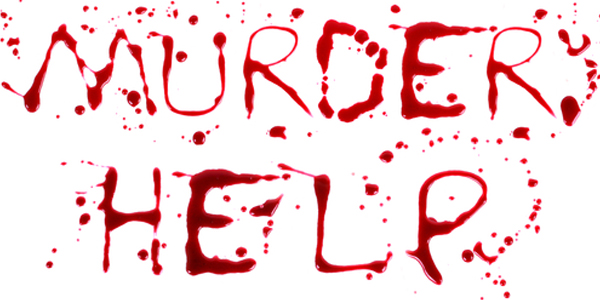
A guest post by Kate Naylor
We’re well into the twenty first century and there are more crime novels than ever to choose from as the genre gains popularity. It seems there’s an endless thirst for thrillers, wherever and whenever they’re set, whatever the plot, style, protagonists or heroes.
Looking back, I’ve hooked out five of the best murder mystery books and authors from the 1900s. If you’re searching for a collection of the finest detective novels and crime writers, you can’t go far wrong with these.
Best murder mystery books of the 1900s – No. 1 – To Kill a Mockingbird by Harper Lee
 Here’s what Wikipedia says about To Kill a Mockingbird, a marvellous legal thriller which formed part of my O’ Level English course back in the late 1970s. I adored the ancient, crackly black and white movie and still re-read the book every couple of years:
Here’s what Wikipedia says about To Kill a Mockingbird, a marvellous legal thriller which formed part of my O’ Level English course back in the late 1970s. I adored the ancient, crackly black and white movie and still re-read the book every couple of years:
“To Kill a Mockingbird is a novel by Harper Lee published in 1960. It was immediately successful, winning the Pulitzer Prize, and has become a classic of modern American literature. The plot and characters are loosely based on the author’s observations of her family and neighbors, as well as on an event that occurred near her hometown in 1936, when she was 10 years old.
The novel is renowned for its warmth and humor, despite dealing with the serious issues of rape and racial inequality. The narrator’s father, Atticus Finch, has served as a moral hero for many readers and as a model of integrity for lawyers. One critic explains the novel’s impact by writing, “In the twentieth century, To Kill a Mockingbird is probably the most widely read book dealing with race in America, and its protagonist, Atticus Finch, the most enduring fictional image of racial heroism.”
As a Southern Gothic novel and a Bildungsroman, the primary themes of To Kill a Mockingbird involve racial injustice and the destruction of innocence. Scholars have noted that Lee also addresses issues of class, courage, compassion, and gender roles in the American Deep South. The book is widely taught in schools in the United States with lessons that emphasize tolerance and decry prejudice.”
I particularly love Atticus Finch, a man confident enough in himself not to feel the need to show off his manliness, which surprises the heck out of his small daughter Scout when he shoots a rabid dog dead in the street accurately and mercifully, without a fuss. And I adore Dill, such a funny little old man of a child, deliciously eccentric. While the book seems awfully old-fashioned these days, Boo Radley is still a powerful enough character to have inspired the name of a UK indie band, The Boo Radleys.
Harper Lee never wrote another book. I guess this was the story she had inside her, and once she’d got it out of her system, that was that.
Best thrillers of the 1900s – No. 2 –The Great Gatsby by F. Scott Fitzgerald
 I remember reading all F. Scott Fitzgerald’s books in my early teens, starting off with Bernice Bobs Her Hair before graduating to the crème de la crème, The Great Gatsby. We watched the movie, starring the wonderful Leonardo DiCaprio, a couple of weeks ago, and I was chuffed to bits that it was so faithful to the book, with plenty of superb direct-off-the-page quotes from the movie’s narrator throughout. But whether or not you’ve seen the movie, the book is one of those reads that transports you to a different world so powerfully that, when you look up for a breather, you’re surprised to find yourself in your home, on the bus or wherever, back in the relatively lacklustre 21st century.
I remember reading all F. Scott Fitzgerald’s books in my early teens, starting off with Bernice Bobs Her Hair before graduating to the crème de la crème, The Great Gatsby. We watched the movie, starring the wonderful Leonardo DiCaprio, a couple of weeks ago, and I was chuffed to bits that it was so faithful to the book, with plenty of superb direct-off-the-page quotes from the movie’s narrator throughout. But whether or not you’ve seen the movie, the book is one of those reads that transports you to a different world so powerfully that, when you look up for a breather, you’re surprised to find yourself in your home, on the bus or wherever, back in the relatively lacklustre 21st century.
The F. Scott Fitzgerald Society website includes an excellent biography of the great man, which is fascinating stuff. And here’s what IMDb says about the film:
“The film follows Fitzgerald-like, would-be writer Nick Carraway as he leaves the Midwest and comes to New York City in the spring of 1922, an era of loosening morals, glittering jazz and bootleg kings. Chasing his own American Dream, Nick lands next door to a mysterious, party-giving millionaire, Jay Gatsby, and across the bay from his cousin, Daisy, and her philandering, blue-blooded husband, Tom Buchanan. It is thus that Nick is drawn into the captivating world of the super-rich, their illusions, loves and deceits. As Nick bears witness, within and without the world he inhabits, he pens a tale of impossible love, incorruptible dreams and high-octane tragedy, and holds a mirror to our own modern times and struggles.”
Top thriller books of the 1900s – No. 3 – Rebecca by Daphne du Maurier

Here’s what the Goodreads site says about Rebecca:
“Working as a lady’s companion, the heroine of Rebecca learns her place. Her future looks bleak until, on a trip to the South of France, she meets Max de Winter, a handsome widower whose sudden proposal of marriage takes her by surprise. She accepts, but whisked from glamourous Monte Carlo to the ominous and brooding Manderley, the new Mrs de Winter finds Max a changed man. And the memory of his dead wife Rebecca is forever kept alive by the forbidding housekeeper, Mrs Danvers.
Not since Jane Eyre has a heroine faced such difficulty with the Other Woman. An international bestseller that has never gone out of print, Rebecca is the haunting story of a young girl consumed by love and the struggle to find her identity.”
Published in 1938, Rebecca has the rare distinction of never having been out of print. The heroine is easy to dislike, she’s so weak and feeble. Her husband DeWinter is eminently dislikeable too. But the anti-heroine Rebecca herself is a foul woman, worse than the awful Mrs Danvers, which is going some. If, like me, you genuinely enjoy hating the characters in a book, you’ll love it!
The book, according to du Maurier herself, is a “study in jealousy”, as explained during an interview with the author 75 years after it was written. You can read the full Monty here, in an interview featured in The Telegraph newspaper.
And here’s a tip for you: The House on the Strand, also by du Maurier, is an absolutely brilliant mystery adventure… time travel included.
Top crime novels of the 1900s – No. 4 – Air Arthur Conan Doyle’s Sherlock Holmes series
 Straddling the late 1800s and 1900s, Sir Arthur Conan Doyle wrote an impressive sixty ‘chronicles’ about his fictional detective Sherlock Holmes. The character proved so powerful and popular that, just like Robin Hood and King Arthur, many people today actually believe Holmes was real. Here’s what SherlockHolmes.org, the Sherlock Holmes Society of London, says about Holmes and the man who created him:
Straddling the late 1800s and 1900s, Sir Arthur Conan Doyle wrote an impressive sixty ‘chronicles’ about his fictional detective Sherlock Holmes. The character proved so powerful and popular that, just like Robin Hood and King Arthur, many people today actually believe Holmes was real. Here’s what SherlockHolmes.org, the Sherlock Holmes Society of London, says about Holmes and the man who created him:
“In developing his own literary character, Doyle based Sherlock Holmes on Doctor Joseph Bell, a surgeon and teacher he had studied with while attending Edinburgh University. Dr. Bell had the uncanny ability to reveal a patient’s symptoms, diagnose patients and report on their origins before they would speak a word to him about their afflictions. Sir Henry Littlejohn, who taught forensic medicine to Doyle also made a large impression and contributed to the development of Holmes’ character.
As far as Holmes’ name, his last name may have been based on American jurist and fellow doctor Oliver Wendell Holmes and his first name may have come from Alfred Sherlock, a prominent violinist of his time. Dr. John Watson, a fellow Southsea doctor and Portsmouth Literary and Scientific Society member who served time in Manchuria, received the honour of having Holmes’ partner named for him.”
Very few of the many Sherlock Holmes movies reveal the man Conan Doyle actually wrote about: obsessive, drug-addicted, probably suffering from a personality disorder. But the most recent TV series, starring the wonderfully-named Benedict Cumberbatch, definitely does. The Sherlock Character Confessions on Tumblr are revealing, saying:
“Schizoid personality disorder, may possibly have an autism spectrum disorder (would most likely be Asperger’s Syndrome). Positive traits: Extremely high intelligence, extremely observant and perceptive to details, possesses creative imagination, keen ability to focus and concentrate outside of exterior distractions, keen ability to understand and predict human behavior, extremely developed ability to make connections using seemingly unrelated data. Negative traits: Inability to empathize with others, disregard for authority, high level of stubbornness, narcissistic, inability to properly deal with emotions, inability to properly deal with boredom, ignorance of common sense and simple knowledge, tendency to overthink and/or over-analyze, inability to conform to social norms.”
There’s a list of every SherlockHolmes books on the Library Thing website, pretty damn handy if you want to read them in the right order.
Best suspense authors of the 1900s – No. 5 – Colin Dexter’s Inspector Morse series
 The wonderful Norman Colin Dexter OBE was born in 1930, an English crime novelist famous for his Inspector Morse novels, written between 1975 and 1999 and adapted for TV between 1987 and 2000. If you’re a US reader you may not have heard of Morse but over here he’s a household name and national hero, despite being entirely fictional.
The wonderful Norman Colin Dexter OBE was born in 1930, an English crime novelist famous for his Inspector Morse novels, written between 1975 and 1999 and adapted for TV between 1987 and 2000. If you’re a US reader you may not have heard of Morse but over here he’s a household name and national hero, despite being entirely fictional.
Here’s what Wikipedia says about Dexter:
“Dexter has been the recipient of several Crime Writers’ Association awards: two Silver Daggers for Service of All the Dead in 1979 and The Dead of Jericho in 1981; two Gold Daggers for The Wench is Dead in 1989 and The Way Through the Woods in 1992; and a Cartier Diamond Dagger for lifetime achievement in 1997. In 1996 Dexter received a Macavity Award for his short story Evans Tries an O-Level. In 1980, he was elected a member of the by-invitation-only Detection Club.
In 2000 Dexter was appointed an Officer of the Order of the British Empire for services to literature.
In September 2011, the University of Lincoln awarded Dexter an honorary Doctor of Letters degree, a higher doctorate which is frequently awarded in recognition of outstanding scholarship or other merits.”
Played to perfection on telly by the sadly-missed John Thaw, the books are beautifully written and masterfully plotted, quintessentially English and hugely satisfying, perhaps a little old fashioned but then again, so was Morse with his vintage Jaguar and tweedily reassuring looks. Here’s a list of the Morse books in order:
- Last Bus to Woodstock (1975)
- Last Seen Wearing (1976)
- The Silent World of Nicholas Quinn (1977)
- Service of All the Dead (1979)
- The Dead of Jericho (1981)
- The Riddle of the Third Mile (1983)
- The Secret of Annexe 3 (1986)
- The Wench is Dead (1989)
- The Jewel That Was Ours (1991)
- The Way Through the Woods (1992)
- The Daughters of Cain (1994)
- Death is Now My Neighbour (1996)
- The Remorseful Day (1999)
What about your favourite 20th century crime novels?
We’d love to know what your favourites are, and why.











